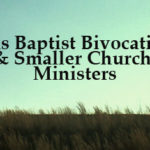Bobby Dagnel will celebrate his 15th anniversary as pastor of First Baptist Church in Lubbock this summer. From deep in the heart of one Texan, he shares his background and thoughts on church and ministry. To suggest a Baptist General Convention of Texas-affiliated minister to be featured in this column, or to apply to be featured yourself, click here.
Background
• Where else have you served in ministry, and what were your positions there?
I came to Lubbock from First Baptist Church in Nederland, where I pastored seven years. This was preceded by First Baptist Church in Hemphill, where I served in my first pastorate five years. Prior to the pastorate, I served three years as the business administrator for First Baptist Church in Tuscaloosa, Ala. This following my first staff position as associate recreation minister at Green Acres Baptist Church in Tyler.
• Where did you grow up?
Tyler
• How did you come to faith in Christ?
Having been suspended from the University of Oklahoma, I was working as a welder’s helper at the pipe shop of an engineering firm in Tyler. The welder for whom I worked asked if I was a Christian. Overcome with guilt and shame, I lied and told him I was. He seemed so genuinely relieved by my answer, I determined that before the next sunrise, I was going to have in my life what this man had in his.
Not growing up in church, I had a friend from high school, Kent Powell, whose father I knew to be a pastor. For two hours that night, I drove in front of the home of Paul and Cathy Powell, circling the block, waiting for them to arrive home. As soon as the front porch light came on, I stopped, approached the front door and knocked.
Sign up for our weekly edition and get all our headlines in your inbox on Thursdays
When Paul answered, I explained my situation, the workplace conversation a few hours prior, my guilt, shame, the conviction that somehow my life was at a crossroad, and that it had to be settled that night. We went into his study, where he explained what it is to be a Christian and how I could awaken each day with a sense of mission and purpose. A half hour later, I walked out his home a devoted follower of Jesus Christ.
• Where were you educated, and what degrees did you receive?
University of Texas at Tyler, bachelor of business administration; Southwestern Baptist Theological Seminary, master of divinity.
Ministry/church
• Why do you feel called into ministry?
Mine is, and has always been, an overwhelming burden for unchurched students and adults whose lives have not been framed, structured or informed by a church culture.
• What is your favorite aspect of ministry? Why?
Leading the church, by challenge and example, to engage. The opportunity to be providentially and strategically used by God, as the presence of Christ, for the purpose of penetrating this world with the offensive movement and force that is the church.
• What one aspect of congregational life gives you the greatest joy?
Our church is one of such rich ethnic, intergenerational and socio-economic diversity, there is nothing more inspiring and motivating than when we gather together in corporate worship.
• How has your ministry or your perspective on ministry changed?
Where I began in ministry 35 years ago, it was a church culture that gave the impression the mission we are called to carry out could be performed inside the walls of a physical structure referred to as the church. One of the refreshing benefits of a post-church culture is that it has demanded of us a deliberate engagement of our communities, drawing us out of the safety of our sanctuaries and into the messiness and brokenness of the human condition.
• How do you expect congregational life to change in the next 10 to 20 years?
Whether it’s increasing hostility toward those Christians who hold to biblical authority or those like Demas, who depart because they love this present world more, I believe there will be a continuing winnowing process and/or a falling away in the visible church. As a result, however, I believe the church will be more efficient, effective and impactful.
• If you could launch any new ministry—individually, through your congregation or through another organization—what would it be? Why?
Ministry partnerships with businesses having an established commitment to our city and region, that desire to see marriages and families grow stronger.
• What qualities do you look for in a congregation?
I’m fortunate that the churches I have had the privilege of serving all have had a desire to be organized and challenged strategically for the purpose of being a missional force and presence in their community and beyond.
• Name the three most significant challenges and/or influences facing your congregation.
Like any church in this post-church culture, if we are to be most effective in accomplishing the mission given us, we must continue to be proactive in anticipating the forthcoming challenges of the next 25 years. If we wait to react, it’s too late. The new definition of “regular church attendance”—once every four to six weeks—has very real implications in programming and budgeting. The ever-growing complexity of issues facing individuals and families, that are beyond the training and scope of seminary-trained clergy, require an awareness of resources and ministry specialists with whom we can partner. The ongoing identification, training, blessing, empowering and unleashing of leaders within the congregation must remain a matter of paramount importance.
• What do you wish more laypeople knew about ministry or, specifically, your ministry?
While pastors always have been “on” and never “off” the clock, the advent of cell phones, texting and emails these past 20 years has taken it to another level. Thus, 24-hour accessibility, congregational oversight, strategic planning, sermon preparation, community engagement and participation, and one’s own spiritual formation mean there are a great many irons in the fire. It’s a tension I long ago embraced and have never begrudged it. Nor do I begrudge the “fishbowl” existence. Should not a pastor’s desire be that our people would practice the things they have learned, received, heard and seen in us? (Philippians 4:8)
About Baptists
• What are the key issues facing Baptists—denominationally and/or congregationally?
Denominationally, the challenge of not just surviving but finding viability in a post-denominational culture. Congregationally, continuing to be a voice and advocate for the time-honored, historic, biblical principles for which Baptists have stood. I preach and teach these not because I’m a Baptist, nor do I do it under the banner of Baptists, but because I believe they are rooted in Scripture.
• What would you change about the Baptist denomination—state, nation or local?
At every level, it probably needs to be re-invented. I’m the first to admit I don’t know how that needs to be done, because my only reference point is the “old tapes” in my mind of how denominational work has been done. Those in their 30s may have fresh ideas for how this might be done.
About Bobby
• Who were/are your mentors, and how did/do they influence you?
Paul Powell. He not only led me to the Lord, but he shaped my philosophy of ministry and service to the local church. He also gave me my first staff position as a minister. His influence was so pervasive in my life, I don’t recall ever disagreeing with him on any matter until I was nearly 50 years old. There probably never has been a day in my adult life that I have not thought of him and his influence in my life.
• What did you learn on the job you wish you learned in seminary?
Seminary provided me a wonderfully enriching academic experience. It dug the well from which I continue to draw, but everything I learned about ministry in the local church—pastoral care, building an efficient organizational structure, dealing with various personality types, leading a staff, casting a vision—I learned from Paul Powell or flying by the seat of my pants.
• What is the impact of ministry on your wife and children?
I have been married to Patti 33 years, and we have two adult children. We have served three wonderful churches as pastor and family. These churches have modeled the love of Christ and, thus, our children grew up loving the Lord and his people.
• Name some of your favorite books (other than the Bible) or authors, and explain why.
When I went to my first pastorate in 1989, I read Resident Aliens by Stanley Hauerwas and Will Willimon. It’s the book that most shaped my approach to pastoring, preaching and leading a church to embrace its unique and distinctive role. The writings of Eugene Peterson and C.S. Lewis represent two voices that have shaped much of my thought. My favorite novelist is Michael D. O’Brien, a Catholic “author, artist and essayist.”
• What is your favorite Bible verse or passage? Why?
“Cast your burden upon the Lord and he will sustain you; he will never allow the righteous to be shaken” (Psalm 55:22). I’m a worrier by nature who wants to fix things, but early on in faith and ministry, there is the realization that some things can’t be fixed, that waiting upon the Lord will bring forth what we cannot not yet see or understand.
• Who is your favorite Bible character (other than Jesus)? Why?
Peter always has had a soft spot in my heart. Like us, he just seems to keep blundering his way forward.
• Name something about you that would surprise your church.
Most are shocked to learn that through the entirety of my educational experience I had a phobic-like fear of public speaking—to the point of taking zeros on all oral book reports, even though I had done the written work.
• If you could get one “do over” in ministry, what would it be, and why?
The number of years wasted early on worrying about whether or not I was liked or if people were happy. One of the first things Paul Powell told me when I surrendered to the ministry was that the most beneficial lesson I could learn for myself, and my church, was that not everybody is going to like you. He said he watched men waste their entire ministries trying to win over the 5 percent to 10 percent who didn’t like them, to the neglect of the 90 percent who wanted to be led in the fulfillment of the Great Commission.
We are called to lead an army, not placate a crowd.
To read other “Deep in the Hearts of Texans” columns, click here.














We seek to connect God’s story and God’s people around the world. To learn more about God’s story, click here.
Send comments and feedback to Eric Black, our editor. For comments to be published, please specify “letter to the editor.” Maximum length for publication is 300 words.